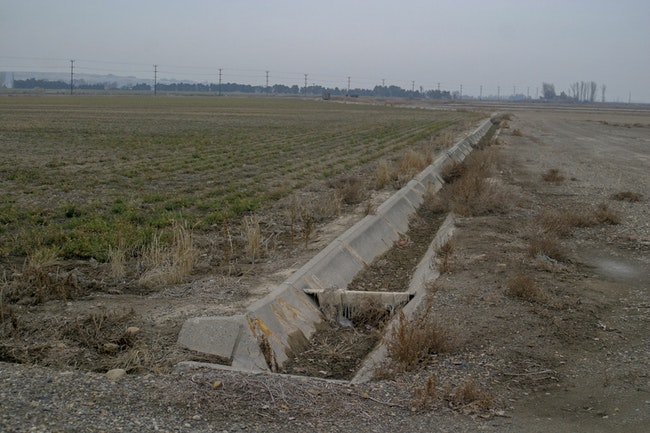
This Nyssa property is the proposed location for the Treasure Valley Reload Center. (The Enterprise/file)
VALE – Two onion industry officials on the public board deciding the future of the rail shipping center have now set up a separate business to arrange for use the center, according to public records.
Meanwhile, recently released emails show Malheur County is still pinning down how much business would be available for the Treasure Valley Reload Center. The emails came to light after the Enterprise sought an order compelling their release.
The rail shipping center, being developed with $26 million in state funds and additional money from Malheur County, is intended to reduce costs for the area’s onion producers and speed up shipments to markets in the east.
To do that, Malheur County is negotiating with Americold, a national shipping and warehouse company, to run the Nyssa shipping center and work with Union Pacific Railroad to move onions on special cars.
The Malheur County Development Corp., established two years ago by county officials, is managing the project. The corporation will decide who gets the contract to run the center and on what terms. It also will oversee the spending of the state money to erect the center, now scheduled to open no sooner than 2022.
Greg Smith, the county’s economic development director, has said that Americold and the railroad want to deal with a single entity to set rates and arrange contracts rather than striking individual deals with onion producers.
This led to creation of the new business and adds another player to an already complex mix of government agencies, public entities and private businesses involved in the rail shipping project.
According to state records, Treasure Valley Onion Shippers LLC was formed as a private business in December. It lists its business address as the office of Lonny Hytrek, an accountant who handles work for the county’s development corporation.
The organizer of the new company is listed as Grant Kitamura, managing partner and chief executive officer of Baker & Murakami Produce Co. in Ontario. He also is president of the county’s development company.
Joining him in the new private business is Kay Riley, manager of Snake River Produce Co. LLC in Nyssa. He is listed in state records as someone with “direct knowledge” of the new company. He also serves on the board of the county’s development company.
Kitamura didn’t respond to written questions about who owns the new company and who sits on its board, or to written questions about whether they see a conflict of interest between serving on the public board and forming a private business that will be involved with the rail shipping center.
However, Riley, in an interview Monday afternoon, said if a conflict of interest surfaced, he and Kitamura would step away from the company.
“There is no personal benefit to me or Grant at this point,” said Riley.
Riley said that “all that has been done is an initial step to form a company that will interact with the operating company and Malheur County.”
“There is not a lot to really discuss about it because it is in its infancy,” said Riley.
This is the most recent example of multiple roles played by those appointed to the county’s development board. One onion producer sat on the board at the time his property was picked for the rail site. An Americold employee from Ontario was on the board at the time his company submitted a proposal to run the shipping center. And a third board member represented a bank now considering providing financing to the development company.
All three have resigned in recent months.
State law prohibits public officials from using their position for personal gain.
Formation of the new company was intended to move ahead talks with Americold. Smith told county commissioners that creation of the new company was important for negotiations over use of the shipping center.
Smith recently got approval from state officials to push back a Dec. 16 deadline to close the deal with Americold. A pact with a terminal operator is crucial to determine operating costs and prices for onion shippers, Smith has said.
Kitamura said in a public meeting recently that Treasure Valley Onion Shippers now represents “75% of shipping out of the valley” with 14 shippers signed on “and probably a potential of one or two more” to come.
Last week, Kitamura released emails sought by the Enterprise that showed struggles to pin down the volume of onions that would move through Nyssa. The right volume is needed to produce revenue to pay a terminal operator, fund the county’s management of the project, and repay loans borrowed by Malheur County.
The emails were released in response to a public records request and soon after the Enterprise petitioned Malheur County District Attorney Dave Goldthorpe for their disclosure.
Smith and his team have provided state officials varying estimates over the past 18 months about what portion of the local onion crop would move through Nyssa. Most shippers now use trucks to take onions directly to markets or to a rail shipping center in Washington state. Some shippers have their own rail sidings.
The effort to pin down onion shipments is chronicled in a string of emails on Dec. 18.
Adam Domanski, an economist with ECONorthwest, a consulting firm retained by the county for the rail project, wrote in an email to Smith that he understood shipper commitments “are still being developed.”
Domanski in a second email said that one report “was using an incorrect estimate for the volume of onions likely to move through the facility.” He said the report listed “the total amount of onions moving out of Malheur County, not the estimate of the volume likely to move through the facility.”
Domanski also wrote Smith that his firm could come up with a volume estimate to share with Americold. This would be, he said, “our modeled estimate of volume, but not the number we’ll be submitting to the state.”
In response to written questions from the Enterprise about the errors and varying numbers, Domanski declined to comment.
Smith forwarded Domanski’s emails to Kitamura on Dec. 19.
“It is imperative that we begin to round up shipper commitments as it relates to volume,” Smith wrote.
He didn’t respond to written questions about the matter.
County officials disclosed last April that they were in tentative negotiations with Americold about leasing and operating the facility, but the status of those talks remain unknown. Smith has repeatedly pressed the Enterprise not to publicly identify Americold as the potential operator.
An Americold spokesman said the company doesn’t comment on negotiations with potential customers.
Americold – with more than 150 locations across the nation – is based in Atlanta, Georgia, and touts it is “the world’s largest owner and operator of temperature-controlled warehouses” with 137 warehouses and “over 75% of those have rail cars.”
Have a news tip? Contact reporter Pat Caldwell: [email protected] or 541-473-3377.
PREVIOUS REPORTING:
Malheur County OKs $1 million to seal land deal as citizens have their say
‘Just be honest’ – respondents want Malheur County Court to be more open with development details
Public wants vote before Malheur County commits millions, survey shows
Malheur County Court hears that county will make back any industrial investment
Malheur County needs another $14 million to build Nyssa industrial park, records show
How the Enterprise produced its story on county land deal, finances
Malheur County leaders mum as appraisal shows land value $1 million less than they agreed to pay
County taxpayers to be tapped nearly $1 million to buy Nyssa property, state reports
Malheur County plans borrowing to buy up private industrial land for future projects
For the latest news, follow the Enterprise on Facebook and Twitter.




